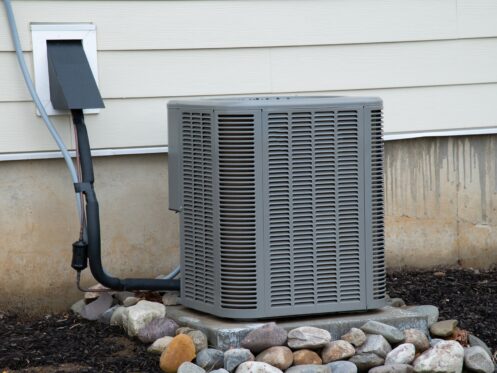Air conditioning (AC) technicians play an important role in keeping our homes comfortable and efficient. Their expertise ensures that heating, ventilation, and air conditioning (HVAC) systems run smoothly, providing us with the right indoor climate year-round. One of the key challenges they tackle is stopping HVAC leaks, which can significantly impact energy efficiency and shorten the lifespan of the system. In this article, we will explore how AC technicians address and stop these leaks, highlighting the importance of preventing them for both energy savings and system longevity.
Understanding HVAC Leaks
HVAC leaks are a common issue that can occur in any air conditioning system. These leaks often happen when there is a breach or gap in the system’s components, such as ducts or coils, allowing refrigerant or air to escape. This can lead to lower efficiency, higher energy bills, and even system breakdowns if not addressed quickly.
Common signs of HVAC leaks include:
- Unusual hissing or bubbling noises from the system
- Poor cooling performance or uneven temperatures
- Increased energy bills without a change in usage
- Ice buildup on refrigerant lines
Understanding the history of air conditioning technology can provide valuable insights into why these leaks occur. For a deeper dive into the evolution of air conditioning, you can explore The Unexpected History of the Air Conditioner from the Smithsonian.
How AC Technicians Identify and Stop Leaks
AC technicians are essential in ensuring HVAC systems function well by locating and repairing leaks. Here’s how they do it:
- Detection Tools: Technicians use special tools like electronic leak detectors and UV dye kits to accurately find leaks in HVAC systems.
- Expertise: Identifying leaks requires a deep understanding of HVAC systems. Technicians are trained to spot even the smallest signs of a leak.
- Sealants: Once a leak is identified, technicians often use sealants to stop it. These sealants are applied to the affected area, sealing the leak and preventing further loss of refrigerant.
- Regular Maintenance: Regular check-ups are vital. Technicians recommend routine maintenance to catch and fix leaks early, ensuring the system runs smoothly and efficiently. For more on maintenance, visit Air Conditioner Repair.
- Environmental Considerations: Addressing leaks is not just about efficiency; it also has environmental benefits. Leaking refrigerants can be harmful to the environment. For more on the environmental impacts of HVAC systems, visit Sustainability of Heating, Ventilation and Air-Conditioning (HVAC ….
Importance of Freon Stop Leak
Freon is a type of refrigerant used in many HVAC systems. It plays a key role in cooling air before it’s circulated throughout your home. However, Freon leaks can be problematic for several reasons:
- Environmental Impact: Freon is a greenhouse gas, and leaks can add to global warming. Quickly addressing these leaks is important for environmental protection.
- System Efficiency: Leaking Freon can cause your HVAC system to work harder, leading to higher energy bills and possible damage to the system over time.
- Health Concerns: While Freon itself is not harmful in small amounts, large leaks can lead to health issues if inhaled over time.
Stopping Freon leaks is essential for maintaining both system efficiency and environmental health. AC technicians are trained to handle refrigerants safely, ensuring your system operates effectively while reducing its impact on the environment.
Role of AC Condenser Cleaner in Maintenance
An AC condenser cleaner plays a vital role in keeping your HVAC system running smoothly. The condenser is a key component of your air conditioning unit, responsible for releasing the heat absorbed from inside your home. Over time, dust, dirt, and debris can accumulate on the condenser coils, reducing their efficiency and potentially leading to leaks.
- Improves Efficiency: Regular cleaning of the condenser ensures that the coils can efficiently release heat, which helps the system cool your home more effectively.
- Prevents Leaks: A clean condenser reduces the risk of leaks by preventing the buildup of pressure that can lead to system damage.
- Enhances Longevity: Keeping the condenser clean helps extend the life of your HVAC system, saving you money on repairs and replacements. For more on cleaning, visit Duct Cleaning.
By using an AC condenser cleaner, homeowners can maintain their system’s efficiency and prevent potential leaks, ensuring a comfortable and safe living environment.
Energy Efficiency and Leak Prevention
Stopping leaks in your HVAC system is crucial for keeping energy efficiency. Leaks can cause your system to work harder than necessary, leading to increased energy consumption and higher utility bills. Here are some practical tips for homeowners to keep their HVAC systems energy-efficient:
- Regular Maintenance: Schedule routine check-ups with a professional AC technician to identify and fix leaks early. For diagnostics and energy-saving solutions, visit Diagnostics & Energy Saving Solutions.
- Seal Ducts: Ensure that all ducts are properly sealed to prevent air from escaping.
- Use a Programmable Thermostat: Adjusting your thermostat according to your schedule can save energy.
- Change Filters: Regularly replace air filters to maintain proper airflow and system efficiency.
- Consider Insulation: Proper home insulation can reduce the strain on your HVAC system.
For more energy-saving tips, you can visit the Department of Energy’s Spring and Summer Energy-Saving Tips page.
By following these tips, homeowners can ensure their HVAC systems remain efficient, reducing energy costs and extending the life of their equipment.
Ensuring Year-Round Comfort with Quality Cooling and Heating
Having a reliable HVAC system is essential for maintaining a comfortable home environment throughout the year. AC technicians play a crucial role in ensuring your system runs smoothly by effectively stopping HVAC leaks. Here’s how they do it:
- Comprehensive Leak Repair: Technicians use advanced tools and techniques to identify and fix leaks, ensuring your system operates efficiently.
- Regular Maintenance: Routine check-ups help prevent leaks and extend the lifespan of your HVAC system.
- Use of Sealants: Professionals apply sealants to stop leaks and improve system performance.
For homeowners in the Greater Austin and Abilene areas, Quality Cooling and Heating offers expert HVAC services. Whether it’s leak repairs or regular maintenance, their commitment to quality ensures your home stays comfortable year-round. With a focus on community and customer satisfaction, they provide reliable solutions tailored to your needs.
Conclusion
Understanding how AC technicians stop HVAC leaks is vital for maintaining an energy-efficient and long-lasting system. By addressing leaks quickly, you can improve your home’s comfort and reduce energy costs. Trust in the expertise of professionals like those at Quality Cooling and Heating to keep your HVAC system in top shape. Their dedication to high-quality service makes them a trusted choice for all your HVAC needs.


